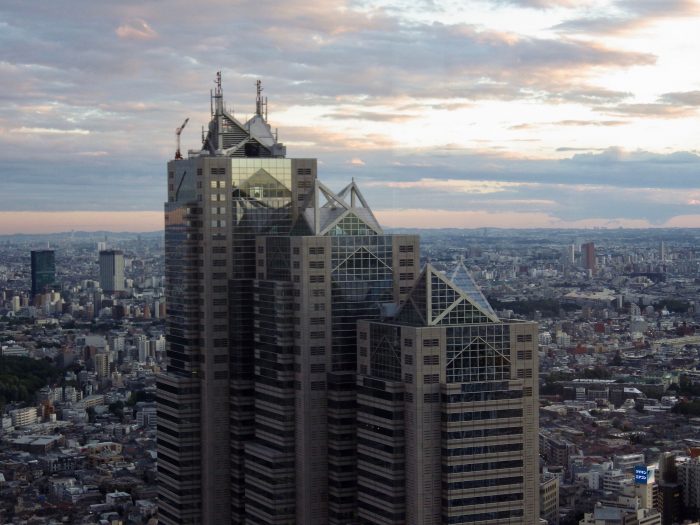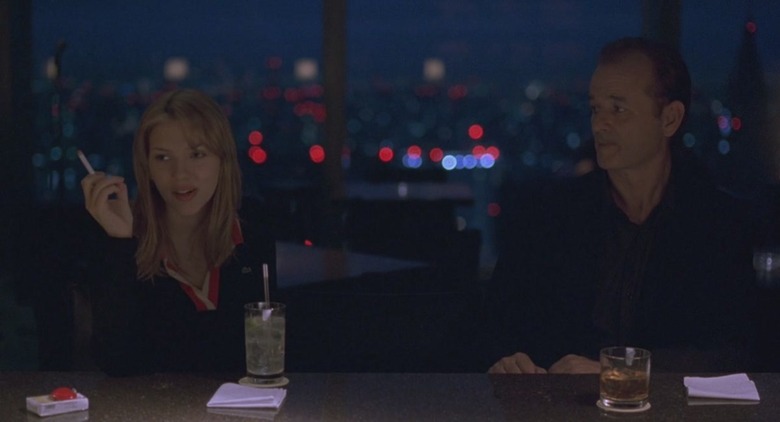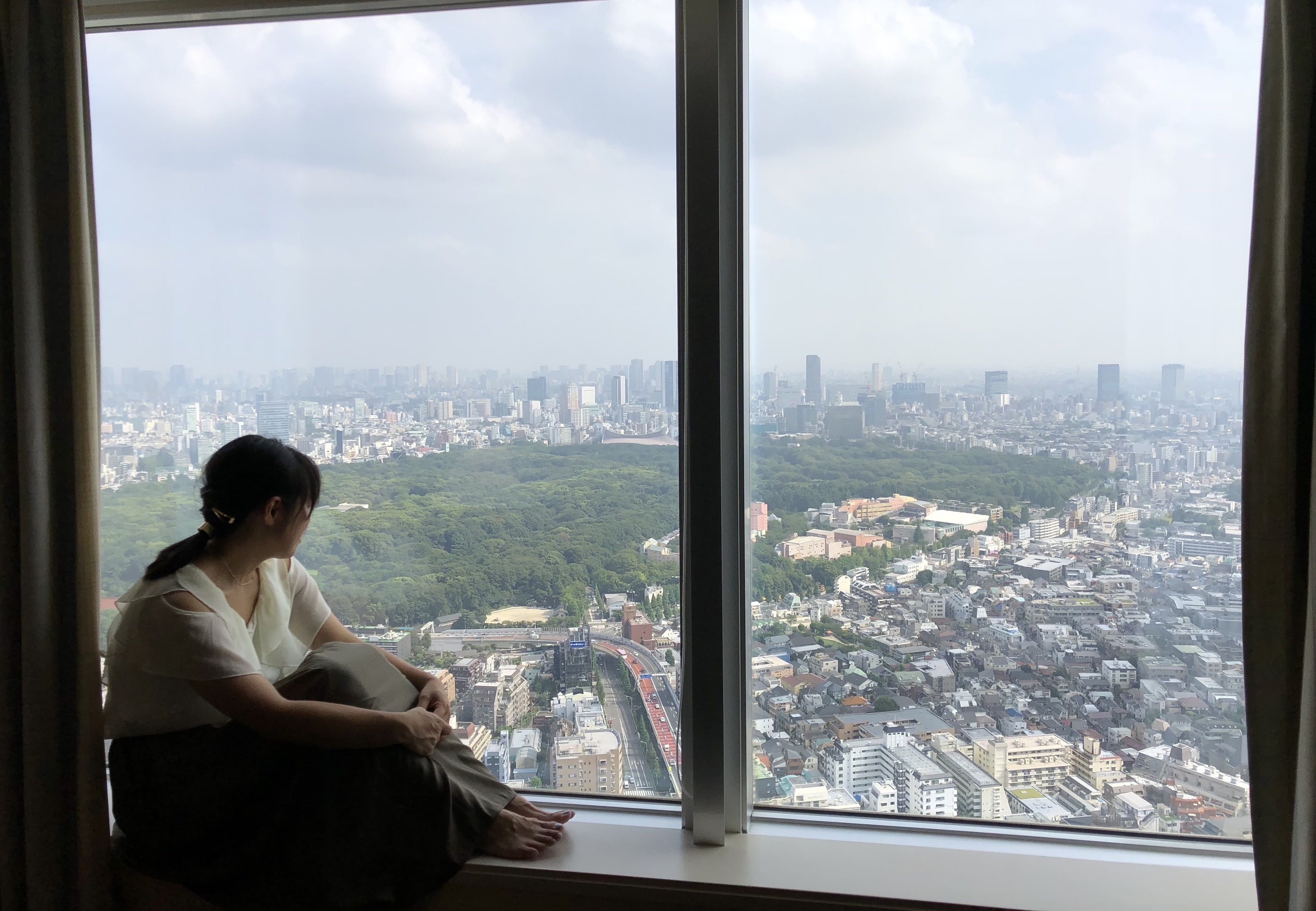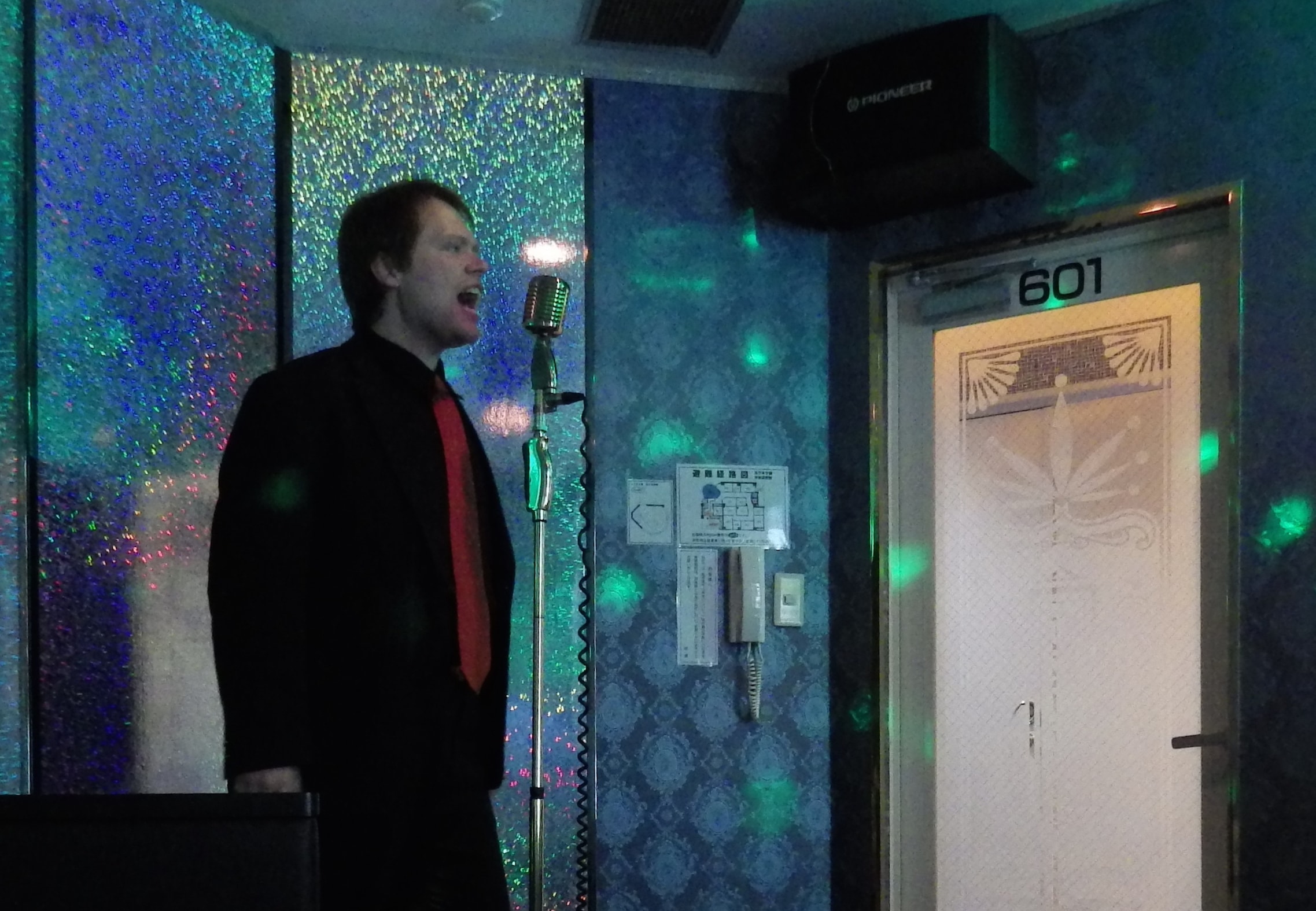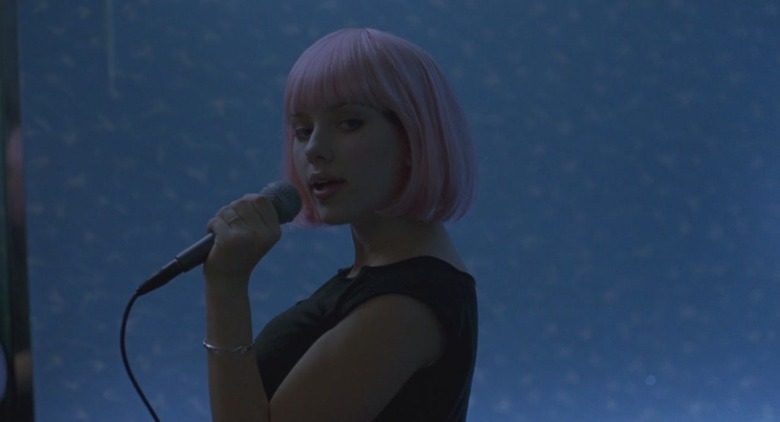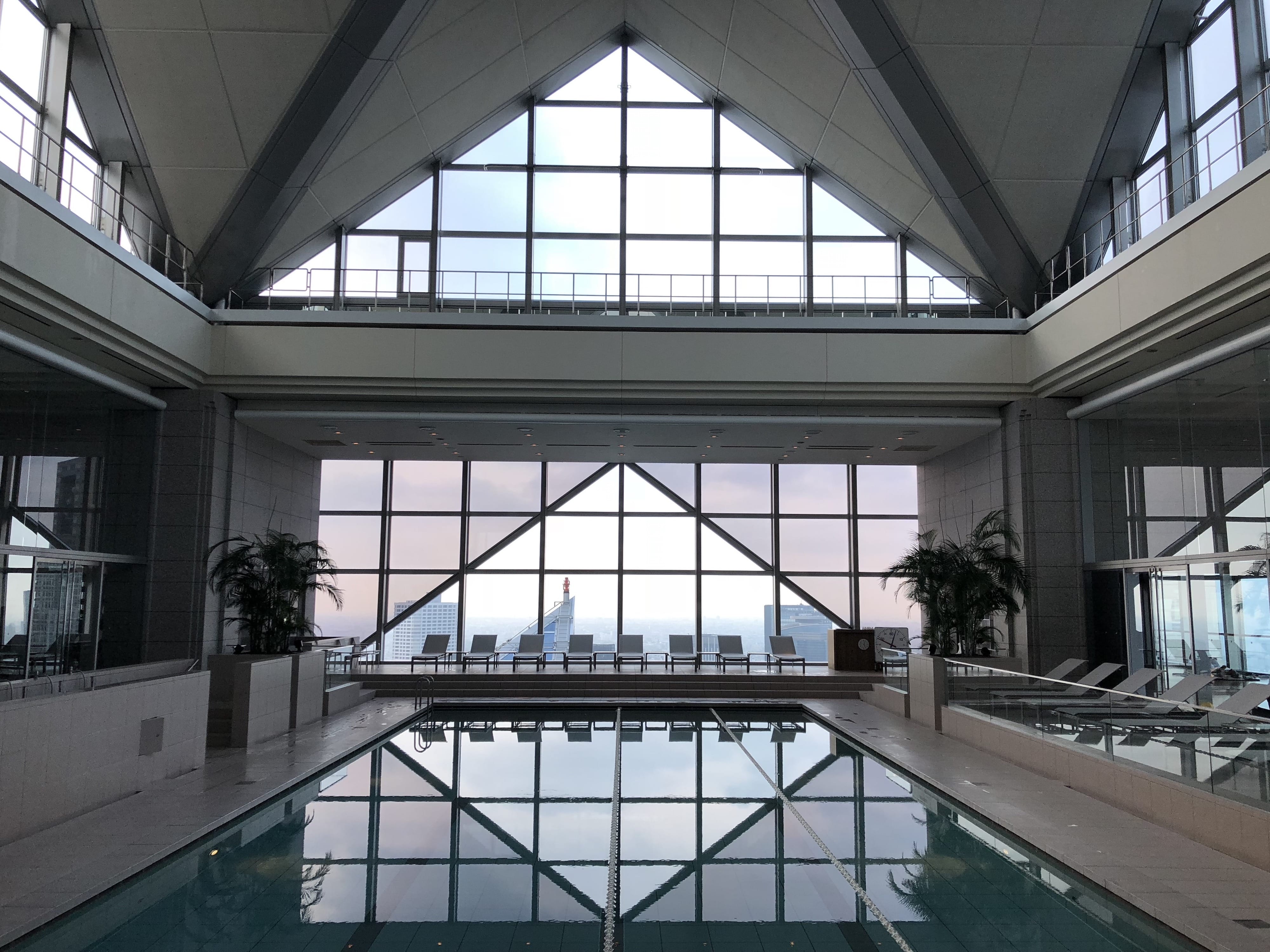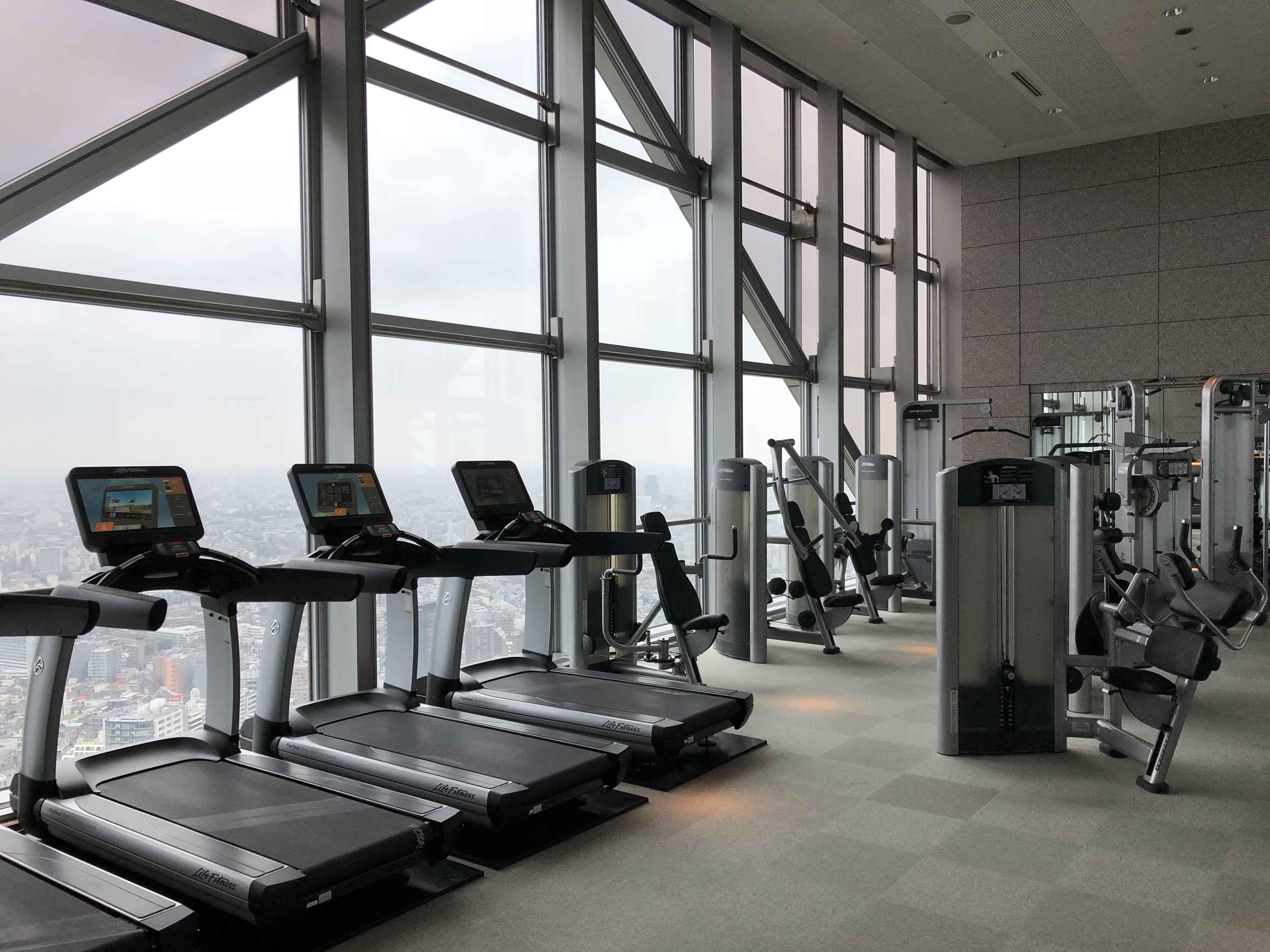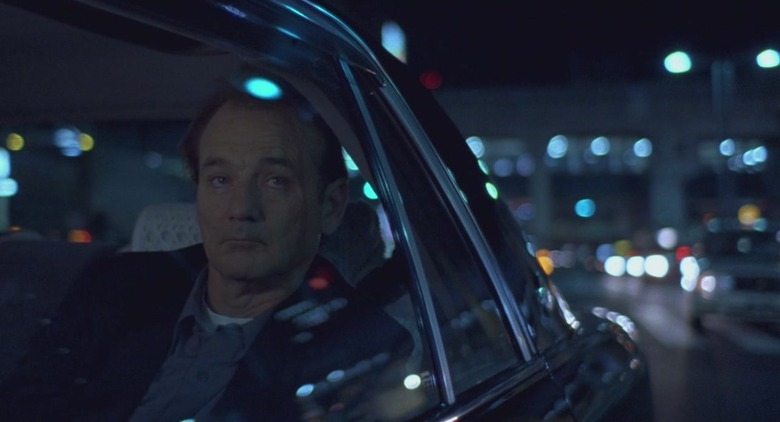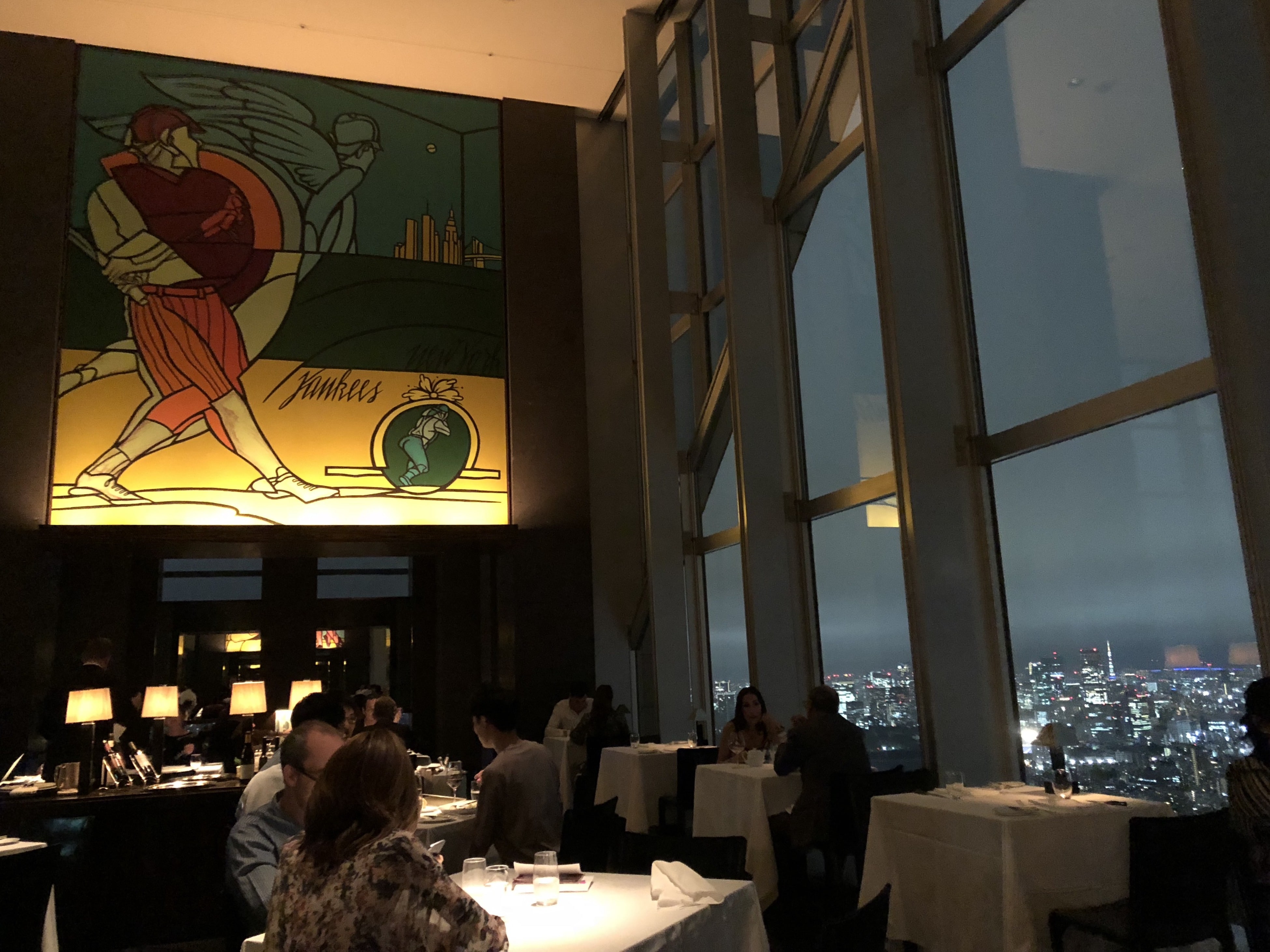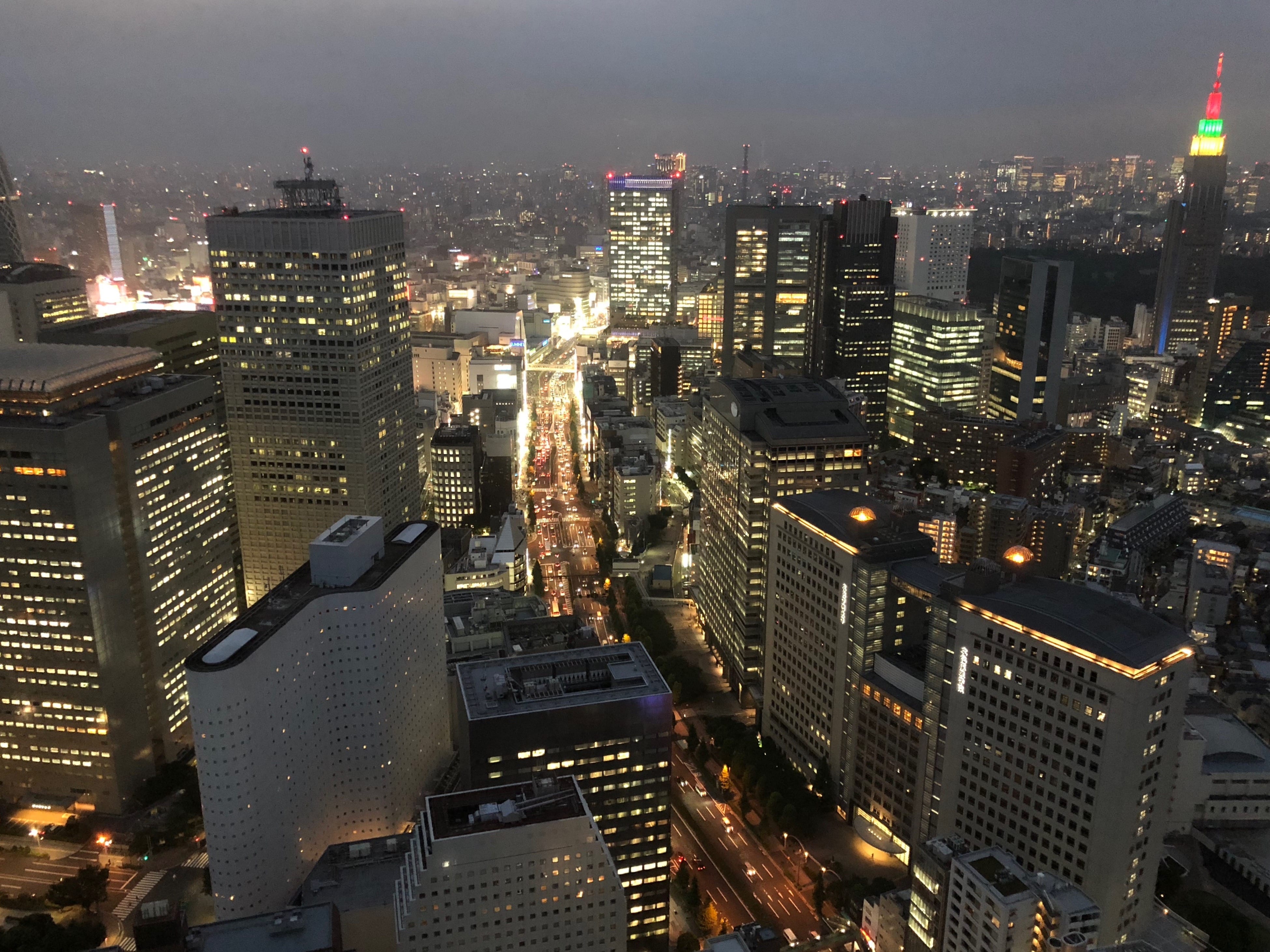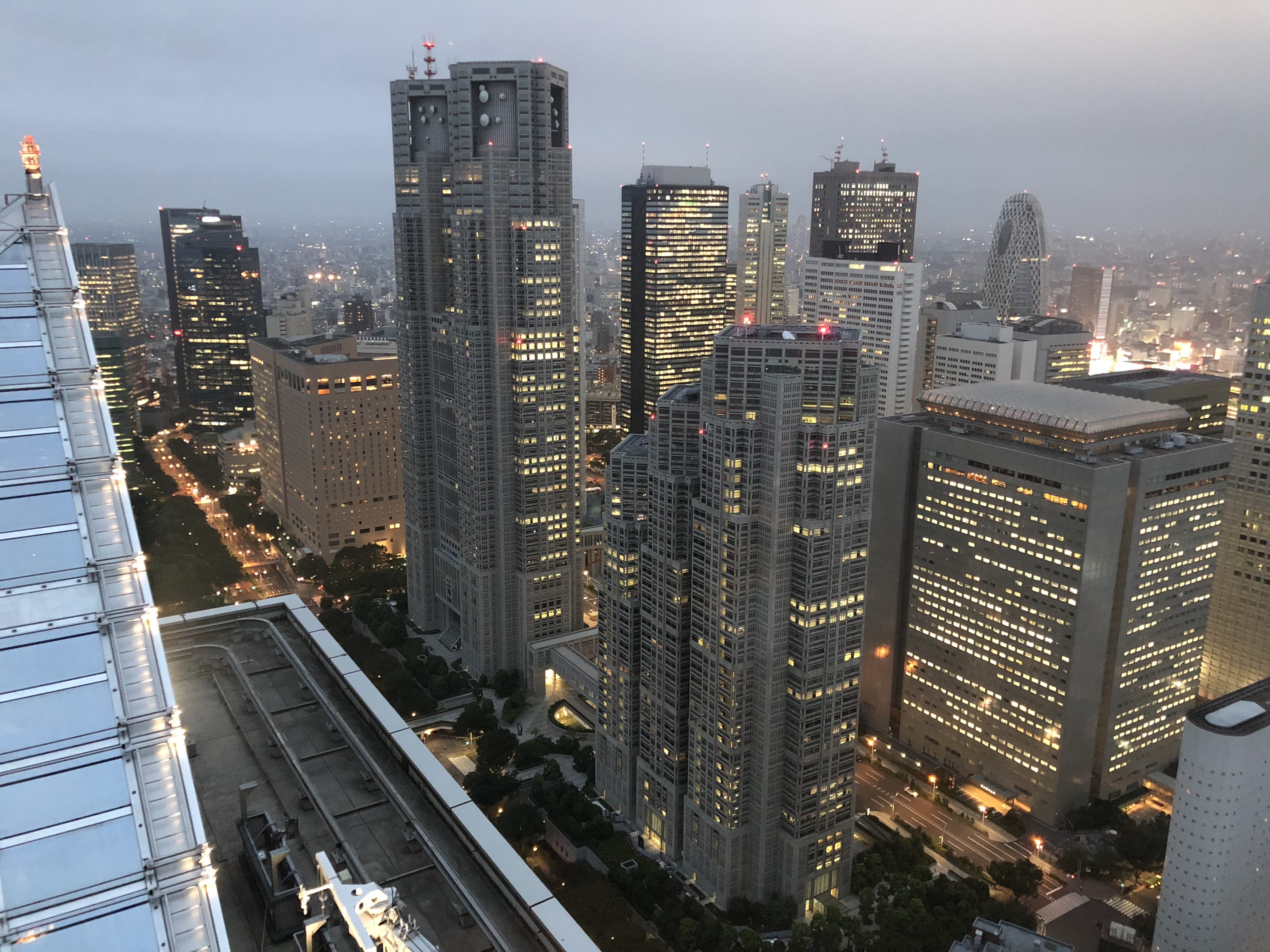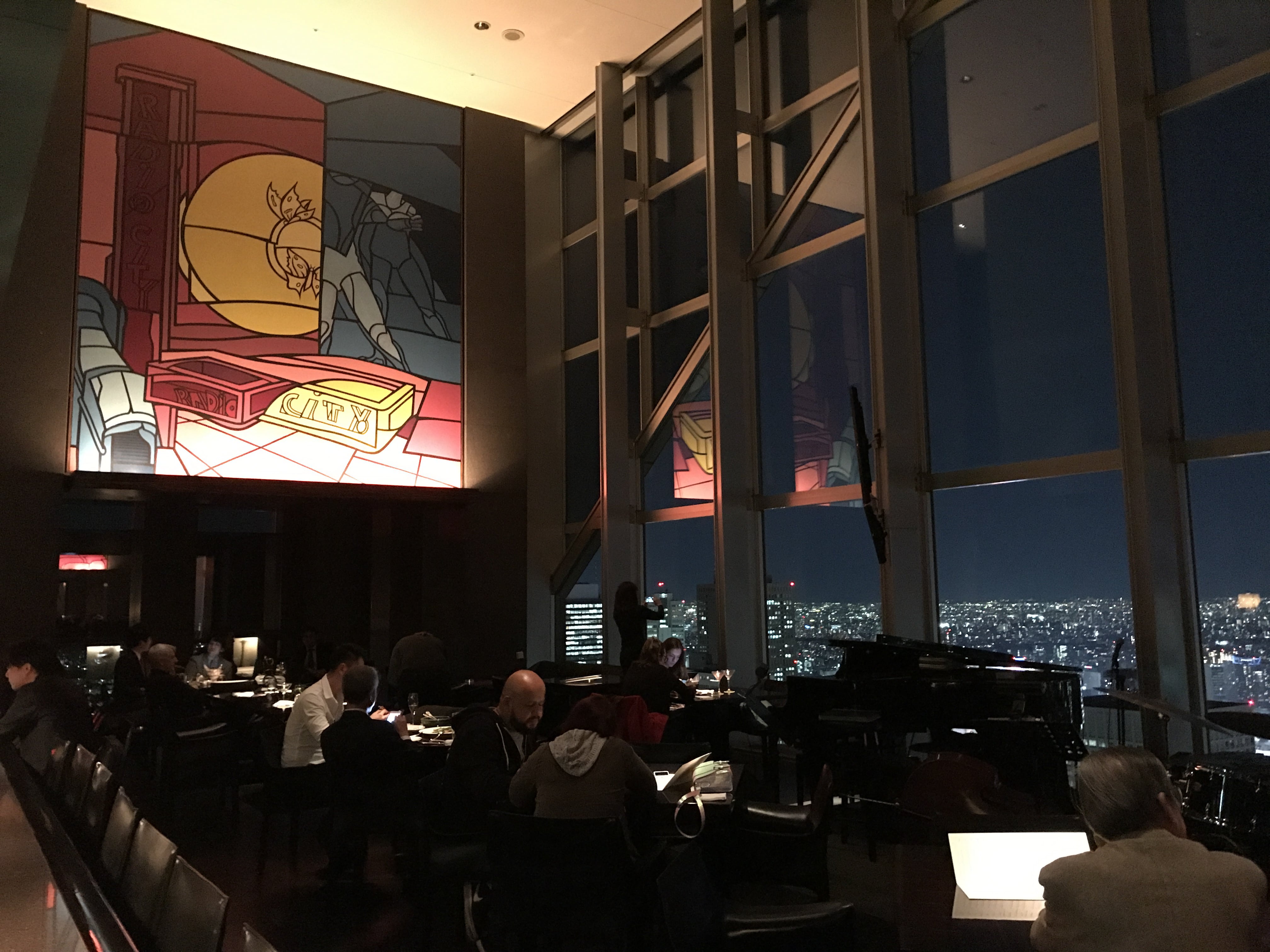Living 'Lost In Translation' And Examining The Film's Global Legacy, 15 Years Later
I used to work in the same building as the hotel where Lost in Translation was filmed.
The Park Hyatt Tokyo occupies the upper 14 floors of the 52-story Shinjuku Park Tower. Even before staying at the hotel last month as part of my honeymoon, I had taught a business English course on one of the office floors. On more than one occasion, I had visited the New York Bar and Grill, the famous real-life venue on the hotel's top floor where Bill Murray and Scarlett Johansson's characters, Bob and Charlotte, first meet in the movie. The place attracts a lot of tourists. At the beginning of the "Tokyo Nights" episode of his CNN show Parts Unknown, it's where the late Anthony Bourdain sat, sipping a beer, talking directly to the camera about the "transformative experience" of visiting Japan's capital for the first time.
It's an old line but in this case, one that holds true: the place itself is a character in the movie (if not, alas, the people). Beginning its stateside run with a limited release in Los Angeles on September 12, 2003, Lost in Translation came along fifteen years ago and showed the Western world the ultimate cinematic vision of Tokyo. No other modern Hollywood film is as strongly identified with this place as Sofia Coppola's. Yet on a broader level, the movie could be set almost anywhere. Strip away the named setting and Lost in Translation endures as a timeless film that evokes a mood of loneliness, romance, and ennui against the backdrop of a big city. Despite its underrepresentation of the Japanese and the multi-layered invocation in the film's title about something being "lost," that feeling does translate and indeed resonate profoundly, speaking to anyone who's ever been away from home or felt alienated in any new environment.
Two of a Lonely Kind
Before Bob and Charlotte meet, Lost in Translation takes its time showing these two lonely people living their separate lives. Our first introduction to Bob comes when he wakes up in a cab cruising past the towering neon edifices of the Kabukicho district in Tokyo. Never mind the goof that his taxi is driving the wrong direction, away from his hotel destination; this shot is about establishing a sense of place, which it does beautifully as Bob blinks through jet lag and sits up in his seat, looking out the window in wonder.
The instrumental "Girls" by Death in Vegas lends this moment an ethereal touch. Later Hollywood movies set in Japan like The Wolverine and The Forest have glided down the same neon-lit stretch in cars but none of them have been able to recapture the same glory. Bob's taxi drops him off at the Park Hyatt Tokyo, where he is greeted, among other things, with a trans-Pacific message from his wife, telling him he forgot his son's birthday.
Alone in his 5-star luxury suite, we see Bob sitting on the bed in his night robe and slippers, not knowing what to do with himself. This iconic image would be used for the film's poster, whose tagline tellingly reads, "Everyone wants to be found." Bob's first foray into the jazzy New York Bar — where he chews a cigar at the same long, lamp-lit counter that Bourdain would occupy a decade later in 2013 — is cut short when his famous face gets recognized by a couple of American businessmen. He returns to his room where the sleepless quiet of his nest of bed covers is interrupted by further messages from his wife, this time being faxed into his room at 4:20 a.m. The resentful, passive-aggressive tone of the messages continues.
When we first meet Charlotte, she's curled up in a windowsill, as is her wont, looking out over a Shinjuku thoroughfare at night. She can't sleep, either. Both of these people are in relationships yet they're emotionally isolated just the same. Charlotte's snoring husband, John, played by Giovanni Ribisi, is a photographer who consistently neglects her, giving her little dismissals like, "I gotta go to work," as he remains absorbed in his own professional pursuits. In the hotel, Bob spots Charlotte on the elevator, and it's not exactly love at first sight, but she gives him a soft smile and then she's gone. Ships that pass in the night.
Bob and Charlotte later see each other across the New York Bar and Charlotte sends him over a drink but it's not until after the 30-minute mark in the movie that they're sitting next to each other, sharing their first wry dialogue scene. So begins one of the great unconsummated romances in film history (unconsummated except for a heart-wrenching last embrace with a movie-mystery whisper and a parting kiss on the lips). Tokyo seems foreign to Bob and Charlotte but of course, they themselves are foreigners, the proverbial strangers in a strange land. The film shifts the axis toward them, following the foreigners as they tramp through the metropolis, using it as their own personal playground.
Earlier this year, I wrote a guide for a travel site to all the different Lost in Translation filming locations around Tokyo. 15 years later, you can still sing in the same Shibuya karaoke box where Bob and Charlotte sang. You can still cook your own food at the table in the shabu-shabu restaurant where they sat across from each other, sharing an awkward last lunch.
Bob and Charlotte's adventures have inspired many visiting Westerners and Lost in Translation holds a special place in the hearts of many movie-lovers, myself included. Living in Tokyo — adopting the sprawling suburbs as my home away from home, to the point where 90% of the people in my life, including my wife, are now Japanese — has definitely changed my perspective on what that means, however. It's made me question the film more rigorously, lending an ear to some of the criticisms over its depiction of the Japanese.
The Issue of Representation
It's not always productive to apply genre labels, but Lost in Translation is as good a romantic comedy-drama as there ever was. It's a movie that mingles yucks with yearning, chucklesome Murray moments with forlorn window gazes. Yet the film's universal themes are also buried under a cosmetic layer that might not always appeal to everyone outside a narrow subset of well-to-do introspective types. Nominated for Best Picture, Best Director, Best Actor, and Best Original Screenplay at the Academy Awards, the film is firmly anchored in the authorial perspective of its writer-director. But how well does the movie play in the real Tokyo?
Lost in Translation doesn't have the same name recognition in Japan (where it goes by the same English title) as it does in the states. If you ask people here, even many Tokyoites have never heard of the movie. It's not until you put on your cinephile spectacles and talk it up as "Bill Murray's best film this side of Ghostbusters" that a glimmer of recognition for the guy from Ghostbusters starts to form in their eyes.
Last year, during the Ghost in the Shell whitewashing controversy — which also pointedly involved Johansson — I embarked on an abortive interview project where I tried to get some Japanese people's thoughts on Hollywood's big live-action anime remake (since it was, after all, their culture that was arguably being appropriated). I quickly learned that people were either indifferent about the movie or hesitant to go on-the-record about it given the disconnect between their own ethnically homogenous population (98.5% Japanese) and the racial and social issues playing out across the diverse American landscape.
One of the people I interviewed, however, was my future wife, who is bilingual but still relies partly on Japanese subtitles for English-language movies. When she was job-hunting in college, she had taken a tour of the Park Hyatt Tokyo, seeing the V.I.P. room where the star of The Last Samurai, Tom Cruise, always stayed. During our interview, Lost in Translation naturally came up and I was interested to hear a Japanese perspective on that movie, as well.
This is a partially translated quote from my wife. Some of the nuances she wanted to impart may literally be lost in translation:
"I have two minds about Lost in Translation. First, my image of that movie is a sad movie. Tokyo is a lonely city. The lonely part, the sad part, of that movie, actually captures the essence of the real Tokyo. But there were other parts I didn't like, because my general impression is that the movie was looking down on Japanese people, using them only as comedic background decoration. We don't want people to see us as monkeys who do these big foolish actions and can't speak English. I felt the movie focused too much on non-traditional Japan, with things like the 'premium fantasy' masseuse scene and the Shibuya nightlife scenes. We don't want to show only neon Japan. That's the foreigner's view of Japan. Maybe that view is also true, in a way. But we want to show the beauty of Japan's rich culture and let the world see that as our public face."
It's true that most of the film's Japanese characters are reduced to silly walk-on roles. Lost in Translation laughs along with Bob's befuddlement (and sometimes jerky impatience) with some of them pronouncing "l" and "r" sounds in an indistinguishable manner. That's a stereotype grounded in truth ... if you come to Japan and cling as stridently to American English as Bob does, you might endure similar miscommunications with words like "lip" and "rip" or "lodger" and "Roger." It's problematic, however, that Bob makes no attempt to communicate in the local language and yet acts put-upon by locals who are doing their level best at meeting him on his own English terms.
By relegating its Japanese characters to the status of window dressing and comic relief, does Lost in Translation do a disservice to Japanese people? Or is Bob and Charlotte's inability to meaningfully connect with the locals a necessary plot point, insofar as it enables them to find companionship with each other in the middle of an alien cityscape?
These questions were at the forefront of my mind last year during the interview and they only seem that much more relevant now in light of the recent success of Crazy Rich Asians. As much as I love Lost in Translation (enough to probably count it as one of my 10 favorite movies of all time), it is, like Blade Runner 2049, a film that seemingly loves Asian culture but not Asian characters.
At one point in the movie, Charlotte mentions that she and John have friends in Tokyo, but bit part "Charlie Browns" notwithstanding, the existence of those friends never manifests itself in any consequential speaking roles. (Contrast this with Cruise's The Last Samurai, another 2003 Hollywood film set in Japan, which, for all its white-savior failings, did introduce the global audience to Japanese actors like Ken Watanabe and Hiroyuki Sanada.) If we had seen Charlotte confiding in her Japanese best friend, for instance, would it make the movie better in terms of representation? Or would the issue then be how the movie reduces its Japanese characters to the level of token sidekicks?
The Limitations of Introversion
To one degree or another, Bob and Charlotte both seem like introverts, people who are not so much shy as turned in on themselves, withdrawn from the world. They're both trapped in their own insular headspace, waiting to be found. That's why the tagline is, "Everyone wants to be found," not, "Everyone wants to find someone." In some ways, the film is predicated on their introversion and if we suddenly saw them reaching out to friends (Japanese or otherwise), the whole thing might start to unravel, because then it wouldn't mean as much when they start to find each other. Early in the movie, Charlotte does reach out to one friend back home but the tearful phone call ends with the friend not listening and Charlotte's pain going unrecognized. That's the extent of her support system.
The film throws up an extroverted foil to Charlotte when she and John run into a bubbly blonde actress named Kelly (Anna Faris) in the hotel. People have speculated that the Kelly character was based on Cameron Diaz, with John being based on Coppola's ex-husband, director Spike Jonze. Jonze and Diaz worked together on Being John Malkovich and his 2013 film, Her, has been seen as a something of a cinematic response to Lost in Translation. It's no coincidence, perhaps, that Johansson voiced the A.I., Samantha, in Her.
At first, it comes across as crass when we hear John's unabashedly bad pronunciation of Japanese names and words like Fukuoka (the city that paraded a 42-foot Star Wars float last year) and moshi moshi (which he butchers with the bovine pronunciation, "moooshy moooshy.") But at least he's making the effort, and maybe there's something to be said for the photographer who ventures out into the world to shoot pictures of human beings while his wife stays cooped up in the hotel room.
It could be argued that leaving the Japanese underrepresented in Lost in Translation is a byproduct of Bob and Charlotte's utter displacement—from America to Japan, and from the world outside their hotel rooms to the world inside their heads. As an American expatriate, someone who once spent Christmas Eve alone at the New York Bar, I can empathize with Bob and Charlotte on the loneliness level ... if not on the socioeconomic level.
Coming off the summer of Crazy Rich Asians, Lost in Translation feels more than ever like a film told from the point-of-view of "Lonely Rich Caucasians." That's not a knock on the movie. Who wouldn't want to be rich? It's just to say that Bob and Charlotte's kind of boredom, the kind that nonchalantly accepts bottles of Cristal champagne as gifts from a record label, is a luxury in and of itself. Knowing Sofia Coppola's bio — how she grew up in Napa Valley, the daughter of Hollywood royalty, and interned with Chanel at the tender young age of 15, eventually going on to star for her illustrious father, Francis Ford Coppola, in The Godfather, Part III before dropping out of art school to start her own clothing line — it's easy to feel the hand of wealth and privilege shaping the perspective of these characters.
Humor, really, is the movie's saving grace. Lost in Translation is a film that was made with obvious affection for Tokyo. Little details in the movie ring true like the sight of grown men reading black-and-white manga comics on the train and the physical awkwardness of low shower heads that were not built with Westerners in mind.
Bob is in Japan doing advertisements for Suntory's "17-year-old Hibiki" whiskey brand. His face can be seen on the side of buildings, similar to how the face of Tommy Lee Jones, the long-running spokesman for Boss Coffee, can be seen on the front of vending machines and in Japanese TV commercials. At a photo shoot, the Japanese photographer coaches Bob by saying, "More tension, please," and, "Tension is mysterious." It's an oddity of speech whose significance will elude most international viewers, but in Japanese, "tension" is a loanword where the meaning is closer to "energy," so that the photographer's coaching translates, "More energy, please," and "Energy is mysterious."
So many things get lost in translation. Perhaps the deepest, funniest scene in the whole movie comes when Bob is shooting a TV commercial for Suntory. As the director tells him what to do in Japanese, you can catch snippets of English from him like, "Casablanca, Bogie, Suntory time." It's true to life and amusing to hear random snippets like that and if you know some basic Japanese and can pick out some vocabulary among the stream of words, you might have a general understanding of the key points the director is trying to convey.
This makes it even funnier because his delivery is exaggerated, like that of a sketch comedian. After all, this is only a stupid whiskey commercial we're talking about, right? It's not bloody Shakespeare. Yet the layers of the onion keep peeling back and if you read the full translation of this scene over on The New York Times, it becomes evident that Bob's zany Japanese director was trying to impart some very meaningful direction to him amid the running gag of a laconic interpreter.
The very first thing the director tells the interpreter in Japanese is, "The translation is very important, O.K.? The translation." Most of what follows, however, doesn't filter down to the clueless foreigner, Bob, who can only sit and blink as the interpreter gives him secondhand, George-Lucas-like directions. Instead of "Faster and more intense," he's told, "Slower, and with more intensity."
So much feeling, real earnest heart, gets lost in translation.
